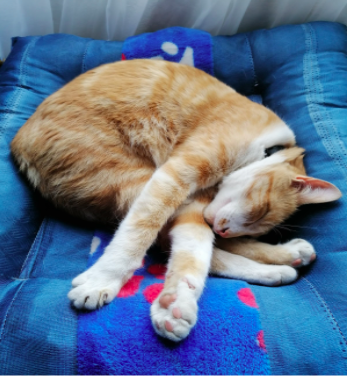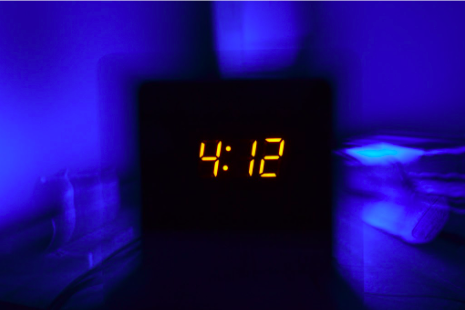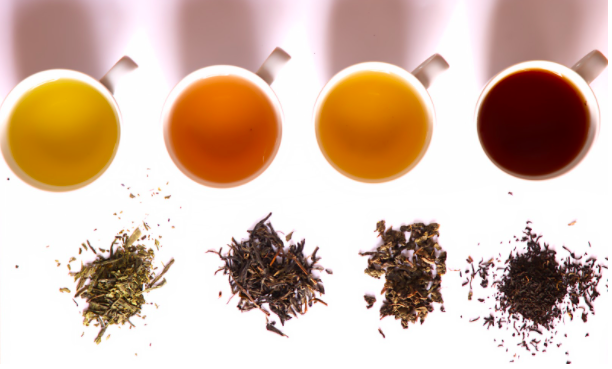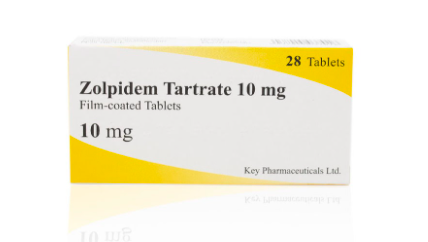Sleep can be a tricky thing; whether it’s falling asleep, staying asleep, being comfortable in bed, or dealing with constant fatigue. In this blogpost, we’ll cover the basics of sleep neurobiology, tips, common sleep disorders, over the counter & herbal remedies that may encourage better sleep, and additional online resources to check out.
Why is sleep important?
- Your body repairs its cells during sleep, important for wound healing, cellular regeneration, etc.
- Digestion and metabolism are affected by sleep.
- Your brain consolidates information and memories.
- People who are deprived of sleep are at a significantly higher risk for obesity, diabetes, heart disease, high blood pressure, kidney disease, and stroke.
- Too little sleep, or poor quality sleep can aggravate gastrointestinal disorders and mental health issues.

What happens when we sleep?
- The stress hormone, “cortisol”, drops when we first fall asleep, and increases upon waking.
- The sleep hormone, “melatonin”, increases right before we go to bed, and decreases once we awaken and are exposed to light.
- Our body temperature drops by one to two degrees typically between 1-4am.
- Breathing, blood flow, brain activity and heart rate change throughout the night, depending on the stage of sleep we’re in.
- We go through several sleep stages, known as N1, N2, N3, and N4/REM. You can read more about them, here.
How much do I need to sleep?
- According to the National Sleep Foundation (data from 2015)
- 18-64 year olds should be receiving 7-9 hours of sleep.
- Ideally, no more than 11 hours and no less than 6.
- This differs for autistic people, people with trauma and other neurodivergent individuals who tend to require more sleep. Plus, those suffering with sleep disorders may need more or less than 6 or 11 hours. Ultimately, there is no “right” amount of sleep, just a general guideline. Focus on what number of hours allow you to feel your best and most well rested.
- 18-64 year olds should be receiving 7-9 hours of sleep.
Some common sleep disorders:
Insomnia: a disorder characterized by difficulty with falling asleep and staying asleep while experiencing feelings of lethargy and fatigue in the morning. Studies have shown that anywhere between 10% and up to 60% of adults worldwide struggle with insomnia. It is more common among adults, women, and those with mental health issues. Insomnia is treated or mitigated with psychiatric therapy, medications and lifestyle changes.
Sleep apnea: loud snoring, gasping for air, waking up with a sore or dry throat, headaches and feeling tired and irritable are indications of potential sleep apnea. Sleep apnea can be dangerous due to the risk of low oxygen, and may require medical intervention which can include Continuous Positive Airway Pressure (CPAP), oral appliances, surgery, and for some, various lifestyle changes. Nearly 1 in 7 people have sleep apnea, according to data analysis from 2018, provided by ResMed.
Narcolepsy: approximately 16% of the general population has narcolepsy, a neurological disorder that affects the brain’s ability to to control its sleep-wake cycles. It leads to sudden attacks of sleepiness and drowsiness during the day. Narcolepsy may be treated with Xyrem (aka GHB) for sleep, and stimulants during the day to combat the fatigue. You can read more about GHB/GBL here (PLS LINK MY GHB BLOGPOST HERE)
Restless Leg Syndrome: a condition in which the patient experiences extreme urges to move their legs. Usually at night, and while lying down or sitting. It is temporarily relieved by moving one’s legs and symptoms come and go over time. People describe days/weeks/months being free of symptoms, and then suffering for several weeks with RLS. Typically, RLS worsens with age and up to approximately 18% of the global population has it.
Parasomnias: describe any behavior that’s considered “unusual” during sleep. This includes, and is not limited to teeth grinding, talking in one’s sleep, sleepwalking, and night terrors. Because of the wide range of behaviors that fall under parasomnias, it is difficult to quantify what proportion of the population suffers from it.

Some common sleep supplements to induce sleep and promote improved sleep quality throughout the night include:
- Melatonin: a naturally occurring hormone that is produced by the pineal gland in our brains. Melatonin is naturally produced in the evening when we’re in the dark, signalling for us to go to sleep. You may also buy melatonin tablets at the pharmacy. Doses range from 0.5mg to 10mg, depending on the person and severity of insomnia. Common side effects of melatonin include headache, daytime drowsiness, vertigo. Long term studies have not been conducted, and so side effects of long term, regular use of melatonin is unknown/unsubstantiated.
- Herbal remedies such as Lavender, Chamomile & Valerian root which can be found as capsules, tinctures, lozenges, and in teas. Chamomile has an antioxidant known as apigen, which has very mild tranquilizer effects that can help cessate anxiety and induce sleep. Lavender contains linalyl acetate and linalool. Studies done on mice demonstrated that those two compounds reduced pain and anxiety. Valerian root interacts with GABA, which is the neurochemical that reduces anxiety (GABA is what alcohol, benzodiazepines, Z drugs and GHB work on). Drinking a cup of tea an hour or so before bed time may help relax you and make you feel slightly sleepier.
- Magnesium; can act as a very mild muscle relaxant and can help you physically relax before bed. Some studies have shown that magnesium can help keep you asleep, especially when used in tandem with melatonin. Some side effects of magnesium can include some GI upset and nausea, particularly with doses of 350mg or higher.
- Benadryl and Gravol; diphenhydramine and dimenhydrinate: AKA motion sickness and allergy medications. Both of these drugs are H1 receptor antagonists, and Benadryl blocks the effects of acetylcholine, in sum, reducing nausea and vomiting, as well as allergic reactions. The side effects include – you guessed it: drowsiness and lethargy. Despite being effective for inducing sleep, it is not recommended that you use anticholinergic drugs for sleep regularly, or for the long-term; some studies have shown a connection between regular use and an increased risk for dementia. Although, short-term and/or occasional use is not linked with the same threat to health, and they can be affordable and accessible sleep aids.

Sleep Hygiene:
Other ways to potentially improve sleep quality that are not through the use or help of supplements and medications include sleep hygiene! Sleep hygiene is a calming routine that someone completes regularly before bed. By following this routine, it teaches the brain to associate particular activities with sleep, and can improve sleep quality and reduce the time it takes to fall asleep. Some examples of activities a person can include in their sleep hygiene routine are:
- Showering or bathing before bed
- A skincare routine
- Putting away screens before getting into bed (even 30-60 minutes before getting into bed)
- Reading a book for half an hour before bed
- Journaling
- Try to stick to relaxing activities; avoid or minimize chores and very invigorating activities such as exercise, working, and elaborate conversations right before bed.
Some additional sleep improving measures include:
- Sleep in clean bedsheets and change them weekly.
- Keep your room at a lower temperature, ideally around 18 to 20 degrees.
- 1-4am is the time your body temperature is the lowest, and you undergo important sleep cycle stages at this time. Try and sleep before 1am in order to ensure a higher likelihood of feeling well rested.
- Keep your space as dark as possible to encourage natural melatonin production. This can be done by using black out curtains, eye masks, turning off any artificial lights, etc.
- Having a diffuser with nice smelling essential oils like lavender and ylang ylang can help you relax and sleep- but remember that some essential oils can pose serious risk to animals/pets – be sure to do your research https://outwardhound.com/furtropolis/health-wellness/pet-safe-essential-oils-for-a-diffuser, and only use essential oil diffusers in a well ventilated area without any animals!
- Exercise, whether this be cardio, yoga, a walk, dance- whatever your heart desires! Exercise will allow you to tire yourself out, and will be more likely to successfully fall asleep at night.
Avoid using stimulants right before bed, this includes coffee, ritalin, cocaine, meth, vyvanse, molly, etc. - Alcohol and other drugs may make it more difficult to fall and stay asleep- and it interferes with sleep quality. If you’re drinking or using drugs, try to drink several hours before your bedtime.
- Consider using a blue light filter on any technology that you may be using before bed. Blue light is what interferes with natural melatonin production. Ideally, no technology 1-2 hours before bed, but this may not be feasible for everyone.
The CDC suggests the following:
- Removing electronic devices from your room.
- Avoiding large meals right before bed, as well as caffeine and alcohol, as both interfere with going to sleep and sleep quality.
- Being consistent with when you wake up and when you sleep, try and stick to a schedule.
If all else fails:
- If you have a GP, talk to your doctor and explain to them your concerns and struggles. Bring a list of supplements and methods that you’ve tried to help with sleep and from there, a GP may:
Prescribe you drugs to sleep; some of which can include Z drugs, or benzodiazepines.
-
- Your doctor may also redirect you
to a sleep clinic to undergo a sleep study
so th ey can address the root of the problem.
ey can address the root of the problem. - You may be encouraged and reminded to practise good sleep hygiene and set a schedule to follow.
- And, if relevant, you may be recommended to pursue psychiatric therapy as many sleep issues arise as a result of unaddressed mental health issues.
- Your doctor may also redirect you
Additional info:
https://www.webmd.com/sleep-disorders/what-happens-body-during-sleep
https://www.sleepfoundation.org/how-sleep-works/stages-of-sleep
https://www.sleepfoundation.org/sleep-hygiene
https://www.cdc.gov/sleep/about_sleep/sleep_hygiene.html
Written by Xeomë at Trip! Project